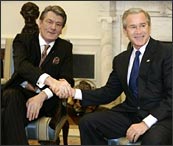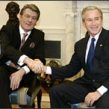
BUSH VISIT, MILITARY EXERCISES CANCELED IN UKRAINE
Publication: Eurasia Daily Monitor Volume: 3 Issue: 114
By:

The U.S. White House announced on June 8 that President George W. Bush would not go ahead with his tentatively planned visit to Ukraine. The announcement termed the decision a postponement, rather than cancellation, of the visit, and tactfully refrained from citing the reasons behind it. The White House had considered two possible dates for the visit to Kyiv: in mid-July shortly before the G-8 summit, or in the fourth week of June on the heels of the United States-European Union summit. Bush ultimately set aside June 22 for Kyiv, but the chaotic political situation there made it inevitable for the U.S. president to change the plan on short notice; he will go to Hungary instead.
Bush’s scrapped visit had been meant to demonstrate U.S. support for Ukraine’s political and economic reforms, Euro-Atlantic orientation, and irreversible independence from Russia. However, since late April Washington had made clear to Ukrainian President Viktor Yushchenko in increasingly urgent tones that the visit could not take place unless Ukraine had a functioning parliament and government by the time the U.S. president arrives. Ukrainian mass media had reported that linkage all along. Apparently unmoved, Yushchenko and his circle persisted with stonewalling tactics in the negotiations over a parliamentary majority and formation of a government. They bear the single largest share of responsibility for the institutional vacuum since the March 26 parliamentary elections.
In April 2005, the freshly elected Yushchenko’s triumphant visit to the United States marked the zenith of hope in the Orange Revolution’s potential to build viable state institutions in Ukraine. Fourteen months later, the cancellation of Bush’s visit marks a nadir in relations and in the crisis of Ukraine’s state institutions as well. To be sure, the United States will not walk away from Ukraine and its problems. But the Ukrainian presidency seems not fully aware of, or impressed by, the level of frustration in Washington.
In parallel with the discussions on the Bush visit, Yushchenko was discussing with the Kremlin the possibility of a visit by President Vladimir Putin to Ukraine — an event that Yushchenko has long sought. On June 9, reacting to the U.S. announcement, Yushchenko acknowledged that the absence of a functioning parliament and government had hindered both visits and stated that Kyiv would continue discussions on the matter with Washington and with Moscow in ways that “balance various considerations; this is the wish of the Ukrainian side” (Interfax-Ukraine, UNIAN, June 9).
Undoubtedly, the forced cancellation of the Sea Breeze and Tight Knot military exercises, which were gearing up to start in southern Ukraine in the first half of June, became a contributory factor in the scrapping of Bush’s visit. On June 7, the Verkhovna Rada missed the last possible opportunity to consider a bill that would have authorized the exercises. That failure, made inevitable by the Ukrainian presidency’s ineffective handling of this issue, doomed Sea Breeze and necessitated the evacuation of some 250 U.S. Marines from the Crimea before they could accomplish their task to prepare that exercise. The June 7 fiasco in Kyiv apparently helped trigger the June 8 decision in Washington to call off the visit.
Attending a NATO-Ukraine Commission meeting at defense ministers’ level in Brussels on June 8, Ukrainian Defense Minister Anatoliy Hrytsenko regretfully announced that those two major exercises must be postponed because of the political situations in Kyiv and the Crimea. According to Hrytsenko’s account of the session, he told U.S. Defense Secretary Donald Rumsfeld that the active phase of Sea Breeze could still be held in July-August, assuming approval by the Ukrainian parliament (1 + 1 TV [Kyiv], Interfax-Ukraine, June 8).
Hrytsenko’s assumption looked unrealistic, however. At that point, protest actions were in full swing in the Crimea against the Sea Breeze exercise, the United States, and NATO. Protesters capitalized on the absence of a legal basis for the exercises. The entry of foreign military units on Ukrainian territory requires parliamentary approval in each case. Yushchenko had last submitted the necessary bill to the Verkhovna Rada in February, unsuccessfully. From the March 26 elections to date, the presidency maneuvered to delay the start of the parliament’s work; thus, there is no constituted parliament in Kyiv to approve the holding of these exercises. Approval by parliament seems in any case more unlikely after the authorities unwittingly energized opposition to the exercises by attempting to hold them without a legal basis.
(Interfax-Ukraine, UNIAN, BBC-monitored Ukrainian television broadcasts, June 1-11; see EDM, June 2, 5)




